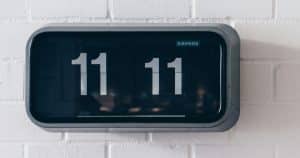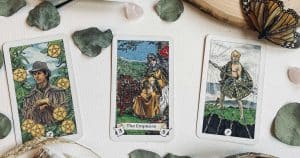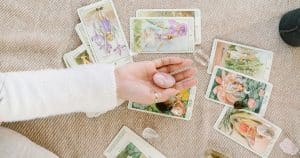“When will I meet the ONE?”
“Is he the ONE?”
“Do I have a soulmate? A twin flame?”
“I’m not sure my partner is my soulmate … what should I do?”
These are probably the most common relationship questions I get. Whether I’m reading cards, doing psychic readings, or performing healing work, clients are very concerned about romantic partnering and this idea of finding the ONE.
The issue that seems to be at the bottom of all of these questions is whether or not you need a significant other to be happy. If people have partners, often they feel there is someone “better” that they should be with. If clients are single, they feel their whole life revolves around the search for that perfect partner, that soulmate, or even their twin flame.
It is unfortunate that so many people feel they are incomplete without another “half” of their soul, or that they are convinced there is only one possible mate for them, and if they don’t meet that person for some reason, there is no chance for romantic happiness.
Why do we think so much about this issue? And what is it really about?
The Myth of the One
I’m going to make a bold statement here: I believe the concept of the “one true love” to be a myth. The idea of romantic love is actually a fairly recent one in human history, and though sexual attraction and love have no doubt been around as long as we have, this concept that there is only one soul with which we can happily share our lives is a creation of modern society. It is NOT a spiritual truth.
Marriage has long been a contract undertaken for economic or political gain or necessity, one to help us survive and procreate. Even today, in some cultures, marriages are arranged by the parents based on ideas of family suitability, astrology, and dowries, and the actual marriage partners have little to say about the whole process. I’m not saying that marriage isn’t a wonderful tradition, but you only have to look at divorce rates to see that, as a contract, it often isn’t the lifetime, romantic, binding agreement that glossy magazines, Disney, and love songs would have you believe.
I feel strongly about this because I see so many of my clients searching outside themselves for a love that may well not exist as they have envisioned it in their mind. It’s important to recognize our longings for love, and it’s a very natural thing to want to partner and procreate. But, when the idea of becoming whole involves another, then the potential for co-dependency exists.
Recipe for Co-Dependency
The most heartbreaking divorces or relationship endings I’ve seen with my clients have been a result of co-dependent relationships. Lana was one such client, and she came to me for a series of healings after a devastating divorce. She and her husband had a really great relationship; they were best friends and had been married for 15 years. They didn’t have children, by choice, and enjoyed a shared life that was truly merged. Until he met another woman. And then, Lana realized that she had wound up her entire identity, lovability, and self-esteem in her marriage.
“I see now that we were totally co-dependent,” she says, two years after the relationship ended. “But I thought that co-dependency only happened in relationships with addiction, or abuse. You know.”
Lana’s story isn’t uncommon, and her journey to healing involved a lot of work on her self-love and self-esteem. She is in a healthier relationship now and doesn’t have the same identification with her partner that she had with her husband.
“We’re more interdependent. I don’t feel like I need him to survive. I’m glad he’s in my life, and I love him. But I love myself now, too.”
Clients who come desperately searching for information about their soulmate often have a real need to learn to love themselves before they can be healthy in a relationship. But hey—no judgment here! Women especially are still raised to believe they are better with a partner; I certainly was, and as such had to make my own journey with romantic love like any other person.
Is It Possible to Be Happy Without a Partner?
Of course it is! Many people have long stretches of time without partnering, and some don’t ever find another person they want to live with for a lifetime. We are the ones choosing whether or not to be happy relative to any life circumstance. Remember, relationships are a lot of work and take energy to sustain—a worthy use of time. And it may be that some people don’t want to invest that time or energy. That’s okay!
I have several clients—men and women—who don’t have a life partner. Some have never really had a relationship and feel fulfilled and satisfied without one. Some are lonely and working on their inner beliefs and choices to make themselves more receptive to finding partnership.
One client, Damon, was married for 20 years before coming out as gay. He has lovers from time to time but doesn’t have a partner. He sometimes worries about being alone as an old man, but he is very committed to creating community, strong friendships, and good relations with his siblings. This is enough for him.
Amy is another client who has never really had a long-term relationship. She’d like to, but has become okay with not doing so. Like Damon, her community, family, and friends comprise the relationships that are fulfilling for her. “You can’t wait to be happy for some guy or girl to come along,” she says. “Life is short. I learned long ago to love myself and to find joy in just being alive. There is a lot more to life than being married.”
Winona really wants a partner, and we are working with psychic contracts and blocks that her soul has created over previous lifetimes to make her life more open to love. She knows that she has a tendency to merge with the men she meets—she has historically been very co-dependent. Understanding that she needs to learn to love herself first, and stand on her own two feet is crucial in her process. I have no doubt that when she least expects it, she will have the opportunity to healthfully partner with another soul—because of the personal growth work she is doing.
The truth is, none of us really know our soul’s plan. Spiritual work with advisors and on your own can help reveal what is in your soul’s highest good. Some people don’t have a big karmic agenda around relationships. Others do—but that doesn’t necessarily make life easier, better, or happier. We ultimately are responsible for our own happiness.
If you are interested in learning more about your relationship choices or blocks, or want help moving forward on issues, an advisor on Keen can help.












